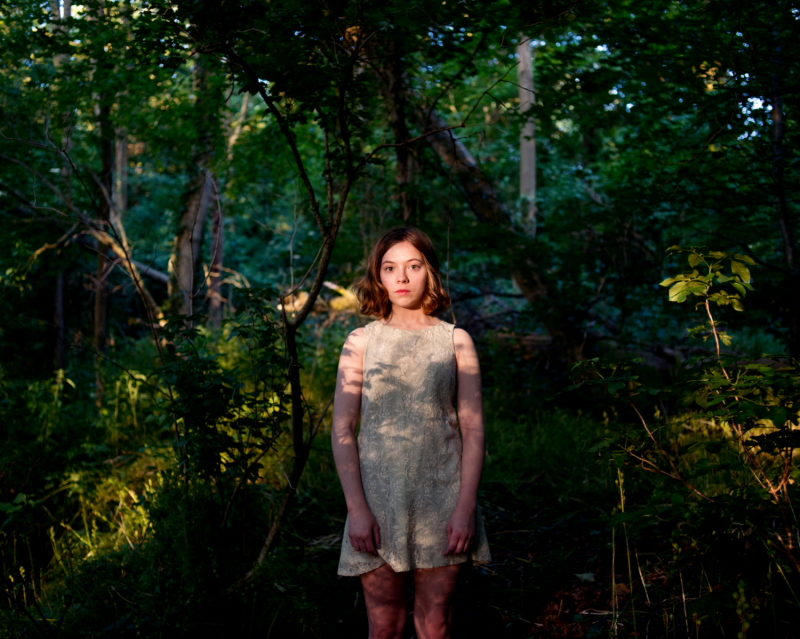Robert Darch (born in Birmingham, 1979) is photographer, educator & curator based in the South West of England. He holds a Masters with distinction in Photography & the Book and an MFA with distinction in Photographic Arts from Plymouth University. His current practice is motivated by the experience of place, for which he constructs narratives that help contextualise a personal perception of those spaces. As well as the physical location this subjectivisation of place is also influenced by contemporary culture, memory and imagination.
Alongside his photographic practice, Robert initiated and runs Macula a collective for young photographers. He also curates work in his studio and exhibition space Dodo as well as in various locations with the Unveil’d festival.



Vale
In the dark lull of winter, after the autumn fall, bare trees quietly emerge from the decaying undergrowth exposing themselves to the elements and the landscape beyond. Once veiled in green, now uncovered, the land beyond the vale opens up, the remembered hills appearing out of the mist to prey on the valley below. They sit quietly, brooding, still, beneath the mottled grey and amber sky, echoes of which are visible in the river as it flows toward the sea. The land is cold, cloaked in a damp depression, the wild garlic lying dormant under the numbed soil and the summer swallows have long since departed. Although time passes, the river flows, there appears a stasis in the landscape during the winter, nature is in waiting, not sure if it’s in the past, present or future.
As he lay in the ambulance watching the birds, dark black cut-outs stencilled against the white haze of the sky, a calm came as his mind slowly dimmed and lost control. In 2001 aged twenty-two Robert was diagnosed as having had a minor stroke.
This episode led to a long period of ill health and It would take close to a decade to fully recover and resume a ‘normal’ life.
During this period Robert no longer wanted to turn the camera inwards, to linger on the reality of his situation, instead preferring to lose himself in fictional constructs of the mind. The world he knew had changed, become smaller, more defined, often devoid of spiritual nourishment. The increased isolation and lack of contact except with the immediate family led to an escape into unreality and the fictional worlds of film and television. Always lost in thoughts his propensity for daydreaming increased. Often these imagined unrealities were hopeful, full of desires, dreams and wishes. Though as the years passed and the hope of recovery was becoming lost in the stasis of his situation and the thoughts increasingly became paranoid, anxious and negative. There was a continuous dialogue, an inescapable white noise, only tempered when the mind was distracted. The role of escapist fiction and drama became paramount in stabilising his sanity, it acted as a prescriptive counter to the reality he was experiencing.





In spring, the landscape is in a constant state of flux, change and regeneration, this natural order dictates life. The rivers flow sparingly, carrying themselves from the slopes to the sea as the landscape is reborn around them. The summer is the culmination of this new life, nature again becomes still, pausing, allowing time for reverie and reflection.
Vale is a nostalgic reinterpretation of summer, youth and the freedom associated with that time, though seen through tainted eyes. The warmth of the Summer is tempered by an internal melancholy of loss and the poetic narrative is in direct response to the emotions, feelings and thoughts cultivated during the period of isolation Robert experienced. The work therefore sustains a constant dichotomy between the perceived beauty of the landscape and an underlying feeling of unease, tension, sadness and loss. The dense verdant landscape often obscures the view, the natural layers of undergrowth acting as metaphor for the layered narratives and for something that is veiled and unseen. Although within the series, youth and beauty is romanticised, there is an obvious disconnection between the people and the landscape, often appearing uneasy, lost or scared within it. The work blends fictional constructs with documentary images to create a subjective narrative and a sustained atmosphere of unease within a constructed sense of place. Although focused on a valley in the South West of England the realisation of the landscape in ‘Vale’ is a construct, part a reimagining of aesthetics and semiotics derived from contemporary culture and also a romanticisation of memory, hope, place and remembered landscapes.







To view more of Robert’s work please visit his website.